Amebiasis: what it is and how to handle it
Amebiasis is an infection caused by the parasite Entamoeba histolytica. It usually spreads when people swallow cysts from contaminated water, food, or hands. Most infections are mild or have no symptoms, but some people get bloody diarrhea, cramps, or a fever. In a few cases the parasite can spread to the liver and cause an abscess, which needs prompt care.
Diagnosis & Treatment
If you have persistent stomach pain, loose stools, or blood in the stool after travel or exposure, see a clinician. Doctors confirm amebiasis with stool tests (antigen tests or PCR are the most reliable). If liver symptoms appear—fever, pain under the right rib cage, or jaundice—an ultrasound or CT usually follows to look for an abscess.
Treatment depends on whether the infection is invasive (tissue-damaging) or just in the gut. For invasive disease, common medicines are metronidazole or tinidazole to kill the tissue forms, followed by a luminal drug—paromomycin or iodoquinol—to clear cysts from the intestine. That two-step approach lowers the chance of relapse and stops spread to others. Pregnant people, young children, and people with other health issues may need different choices—talk to your clinician about risks and alternatives.
Simple steps help while you recover: stay hydrated, avoid anti-diarrheal drugs until a doctor says it’s okay, and complete the full course of prescribed medicine even if symptoms improve quickly. Most people start feeling better in a few days, but full clearance of cysts can take longer and needs follow-up testing when advised.
Prevention & Travel Tips
Preventing amebiasis is mostly about safe food and water. Drink bottled or boiled water in risky areas. Avoid raw salads, peel fruits yourself, and skip ice made from tap water. Wash hands with soap after using the toilet and before handling food. In crowded or low-sanitization settings, assume water and fresh produce might be unsafe.
If you travel often, carry oral rehydration salts and a basic travel first-aid kit. Ask your clinician about what to do if you get diarrhea overseas. If someone in your household has amebiasis, clean bathroom surfaces, wash clothes and bedding on a hot cycle, and avoid preparing food for others until treatment is finished.
Worried you might have it? Book a checkup. Early testing and the right meds make amebiasis easy to treat and stop it from getting worse or spreading to others.
